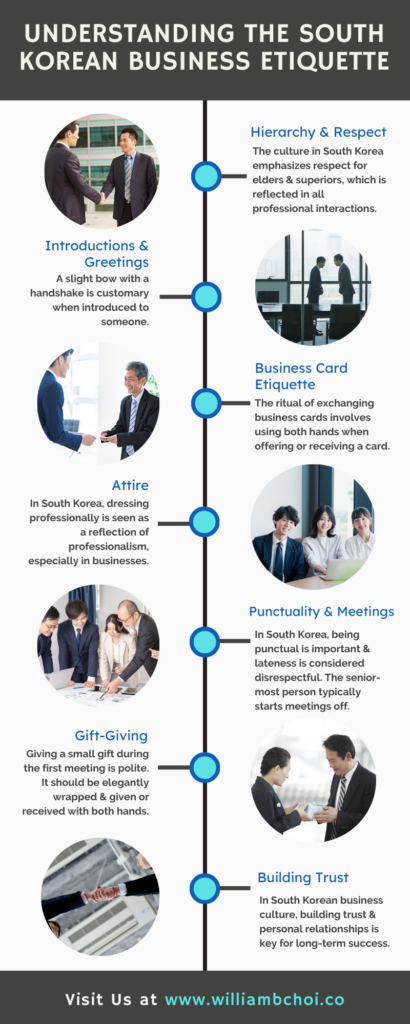Risks of Doing Business In South Korea: Navigating The Landscape
As much as South Korea is a nation of vast opportunities for foreign businesses, there are also risks of doing business in South Korea. This article discusses these risks and the challenges foreign entities might encounter when entering this market.
A nation with a booming tech industry and vibrant economy, South Korea is a promising land for foreign entrepreneurs. However, as with any foreign market, it’s critical to understand the potential issues. The intricacies of the South Korean business landscape might not be immediately apparent. Recognizing these challenges can help navigate a successful venture.
With expertise gained through years of experience, William Choi has made it his mission to guide businesses through these intricacies. For insights that can help shape your venture in South Korea and navigate the hurdles, contact us today.
1. Economic and Financial Risks
South Korea, the world’s 12th-largest economy, presents both abundant opportunities and distinct economic challenges for businesses. Being heavily reliant on exports, especially electronics, automobiles, and shipbuilding, exposes the nation to global market volatility.
Disruptions in trade or fluctuations in international demand can considerably impact the country’s economic health. Moreover, South Korea struggles with rising household debt, accounting for 104.5% of the country’s nominal GDP in the first quarter of 2023. This debt poses potential risks to financial stability and domestic consumption.
source: tradingeconomics.com
Foreign businesses and investors must also be aware of exchange rate vulnerabilities, as sudden shifts can potentially impact the profitability of their operations. To navigate South Korea’s economic landscape, it’s essential to have a keen understanding of these financial risks.
2. Regulatory and Legal Challenges

South Korea’s complex regulatory and legal framework can easily intimidate foreign businesses. Despite being comprehensive, the country’s laws often include an almost overwhelming number of layers of bureaucracy, which gets daunting for newcomers looking to start a business in South Korea.
The South Korean government has promoted business-friendly regulations. However, you will still need to work with a local professional to navigate the complexities.
William Choi
Robust intellectual property rights require careful adherence, and patent infringements are a frequent litigation area.
The stringent 2016 anti-corruption law in South Korea, also known as the Improper Solicitation and Graft Act or the “Kim Young-ran law,” dictates the business scene. The law mandates high transparency and has strict provisions against graft, affecting even routine business practices like corporate gift-giving.
Sectors like finance, pharmaceuticals, and broadcasting in South Korea have specific regulations that may contrast with Western norms.
Foreign entities must work on gaining a deep understanding and adhere to these regulatory nuances, or else face the risk of potential fines, legal repercussions, or even expulsion from the market.
3. Cultural and Linguistic Barriers
The rich cultural tapestry of South Korea, while fascinating, tends to present unique challenges for foreign businesses. The business culture, rooted in Confucian traditions, emphasizes respect, hierarchy, and building long-term relationships.

Concepts such as Jeong (deep emotional bonds) and Kibun (keeping harmony) are pivotal in professional interactions. Misunderstanding or unintentionally offending these principles can jeopardize business relationships.
While many South Korean professionals are proficient in English, decisions or critical negotiations often depend on the subtleties in the Korean language. Expressions, idioms, or the cultural context behind words, often lost in translation, could potentially lead to miscommunication or missed opportunities.
Foreign businesses looking to thrive in the South Korean market must invest time in understanding and respecting the cultural and linguistic nuances, especially when engaging in activities such as networking. It’s possible to bridge these gaps with the support of local intermediaries or cultural training programs.
4. Human Resources and Talent Acquisition
Boasting one of the world’s most educated workforces, South Korea also has unique challenges associated with this asset in terms of human resources and talent acquisitions.
Sourcing talent that understands both Western and Eastern business customs can be a challenge and can lead to difficulties for foreign businesses entering the South Korean Market.
William Choi
While the competitive educational environment produces highly skilled individuals, the traditional corporate culture may occasionally clash with Western management styles emphasizing initiative and autonomy.
Yet another concern is retention. While loyalty to a single employer used to be the norm once, the younger generations are frequently transitioning in their careers, seeking improved work-life balance and diverse experiences. Expectations pertaining to job stability, bonuses, and hierarchical respect may also differ from Western norms.
Foreign businesses often grapple with these cultural nuances, from recruitment strategies to workplace integration. To truly harness the potential of South Korea’s talent pool effectively, businesses need to navigate these HR complexities.
5. Market and Competitive Landscape
Paving the way into the complex, competitive landscape of South Korea’s market can be arduous for businesses.
The first challenge in this regard is the Chaebols – the dominating conglomerates – such as LG, Hyundai, and Samsung. Owing to an extensive market reach and influence, newcomers will find it difficult to establish a foothold.
Moreover, local businesses evidently understand consumer behavior and regional preferences better and often have a competitive edge. In particular, the tech sector is fiercely competitive, with high consumer expectations and rapid innovation cycles.
Not to forget, brand loyalty runs deep; local consumers often favor homegrown brands over international names unless the latter brings prestige or distinctive value.
For foreign businesses, establishing trust, differentiation, and localization is paramount. Without a strategic approach acknowledging these market dynamics, foreign entities may struggle to achieve sustained growth or capture significant market share.
6. Geopolitical and Regional Considerations

South Korea’s geopolitical landscape presents unique considerations for businesses. Its position on the Korean Peninsula has it sharing a border with North Korea, a relationship that remains tense despite diplomatic efforts.
With major powers like China, Japan, and the U.S. engaging in periodic escalations, military exercises, and regional dynamics, there are market uncertainties. The Korean War’s unresolved status and intermittent provocations necessitate businesses to incorporate potential geopolitical disruptions into their risk assessments.
Economic interdependencies, especially with China – South Korea’s largest trading partner- bring opportunities and vulnerabilities. Actions like Beijing’s informal sanctions on South Korean businesses in 2017, retaliating to the THAAD missile defense system deployment, display the ripple effects of geopolitical decisions on the business landscape.
Foreign entities in South Korea must consider staying abreast of the geopolitical complexities for sustainable and resilient operations.
7. Technological Risks
A technological powerhouse, South Korea is also a fast-paced economy that brings its own set of challenges. The country’s rapid technological advancements place special emphasis on innovations, pushing businesses to evolve and adapt continually. Such a relentless pace increases R&D costs and shorter product life cycles.
The dominance of local giants such as LG and Samsung presents a challenge for new companies looking to compete in the technology space.
WILLIAM Choi
Additionally, the dominance of local tech conglomerates, such as LG and Samsung, poses significant competition for foreign entities, especially in the electronics, telecommunications, and software development sectors.
Having been subjected to high-profile cyber-attacks, cybersecurity is another crucial concern for South Korea. This emphasizes the need for businesses to invest considerably in robust security measures.
Furthermore, it is vital to understand and adhere to data protection laws, local digital regulations, and technology standards. Staying ahead in such a vibrant tech environment requires not just innovation but also vigilance against potential technological risks.
8. Operational Difficulties
The operational challenges in South Korea can often catch foreign businesses off-guard. Although the country’s supply chain and logistics systems are advanced, they have unique characteristics requiring detailed comprehension.
Local certifications, like the mandatory KC (Korea Certification) mark for electronic products, can be complex. The stringent quality standards might differ from Western norms; businesses must adjust their products or services accordingly.
From distribution agreements to vendor interactions, local operational etiquettes may diverge from international practices. Moreover, businesses must also keep up with the periodic changes in regulations that may impact operations.
Unexpected delays, cost overruns, or regulatory hurdles are common operational difficulties businesses may face in the South Korean market.
9. Consumer Behavior and Preferences
While presenting impressive opportunities, the vibrant and rapidly evolving South Korean consumer landscape also presents distinct challenges.
source: tradingeconomics.com
South Koreans are tech-savvy, discriminating, and strongly influenced by the latest trends, often driven by popular technological and cultural advancements. While they’re on the lookout for premium and innovative products, there’s also an unwavering loyalty to local brands. This loyalty stems from national pride and tailored products catering specifically to Korean tastes and sensibilities.
The nation’s digital landscape, dominated by platforms like Naver instead of Google or KakaoTalk over WhatsApp, highlights the significance of localization. Trends here tend to shift swiftly, fueled by influential K-pop stars, TV shows, or online influencers.
Foreign businesses must be perceptive, agile, and willing to adapt their strategies to align with the dynamic preferences of the South Korean market.
10. Challenges in Taxation and Repatriation
South Korea has a layered tax system comprising corporate tax, value-added tax (VAT), and various local taxes, each with different regulations. Foreign companies often face scrutiny of the repatriation of profits.
While South Korea has double taxation treaties with many countries, preventing businesses from being taxed twice on the same income, claiming these benefits involves stringent documentation and adherence to deadlines.
With the robust regulatory environment surrounding transfer pricing, businesses must maintain meticulous records and ensure transactions align with market values.
Frequent amendments to tax laws mean that businesses must stay up-to-date or seek local expertise to remain compliant. Thorough planning, understanding of the local legal framework, and often, expert guidance will help businesses deal with the taxation intricacies and ensure smooth profit repatriation.
Final Thoughts: Moving Beyond the Risks
Despite the many risks, South Korea remains a land of opportunity with numerous advantages for businesses willing to put in extra effort. A well-informed approach and local insights will help pave the way for success in this promising market.
To work through the complexities of the South Korean market with confidence and expertise, reach out to us.
- Risks of Doing Business In South Korea: Navigating The Landscape - September 27, 2023
- Business Networking in South Korea: Maximizing Your Opportunities - September 27, 2023
- The Rising Dragon: Advantages of Doing Business In South Korea - September 27, 2023



